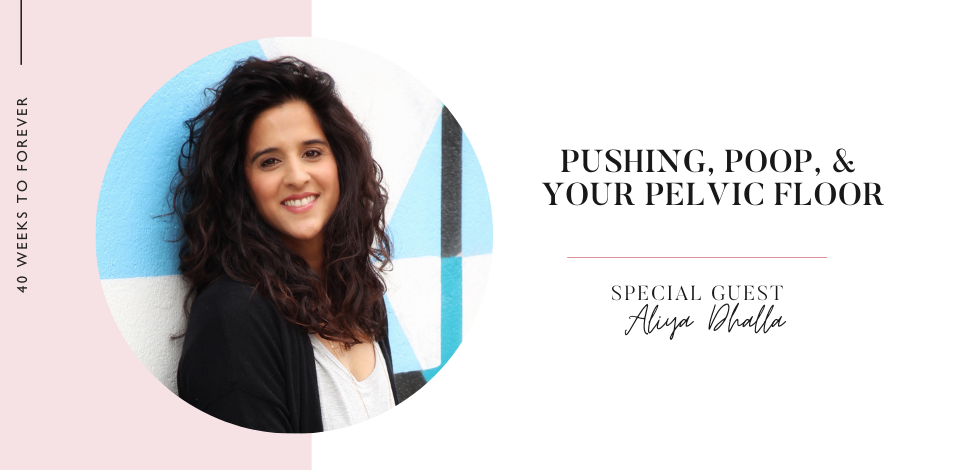Pushing, Poop and Your Postpartum Body
Jump to Section

Is it normal to pee a bit during my workouts?
Can you actually have sex after just six weeks?
How do I know if my Caesarean scar is healing properly?
In this episode of the 40 Weeks to Forever Podcast we set out to answer these questions [and more] including why so many women afraid that they might just poop on the table during delivery. So, today we are chatting with Aliya Dhalla from boxwellness co. She's a Pelvic Health Physiotherapist who is on a mission to tell you all the things you wish you knew about your vagina + pelvic floor. We chat about how to prepare your body for labour, what happens “down there” during the pushing process, and how to re-gain your quality-of-life post baby.
Warning: You will appreciate how Aliya keeps things really real. If you think you have ever wondered about poop or your pelvic floor, keep reading.
Here are a few highlights from our candid conversation with Aliya.
What actually happens “down there” during the pushing process of delivering a baby vaginally?
...a lot of us don’t even really think about what happens. We don’t think about what structures in our body are responsible or assist this whole pushing situation. During a vaginal birth, our pelvic floor muscles, like the muscles down there, they are not the muscles that squeeze and contract and shoot the baby out. That’s just not how it works. Those muscles are supposed to, and what we want them to do ideally is to relax, to lengthen, to let go and to really honestly just get out of the way and make room for baby to exit that way. And what is happening in our body to help to push baby out that way, is our uterus is actually contracting and each contraction that we have and that we experience, the uterus is a big muscle and it’s contracting and kind of pushing baby down and out. Along with an increase in pressure that we are creating in our own bodies by using our breath to generate this increased pressure to help as that uterus is contracting, we are also increasing intra-abdominal pressure. The pelvic floor muscles are relaxing and hopefully moving out of the way and stretching to make room for baby to come out.
What can we do to ensure that we are healing properly? If you are a first-time parent who hasn’t done this before you don't really have a baseline to reference after that 6-week mark.
Once a baby is born, I think a lot of us who are moms and those of us who aren’t yet moms can appreciate that all of the focus is just on the baby and there’s really not much post-partum care that’s offered to mom unless she is really going out to find it for herself. So if I can offer a few tips as to what we can do immediately without having to really go too far and seek help, then I would be happy to do it.
So I really encourage women to get a mirror and take a look down there. Check out what it looks like. Some of us have done this before having babies, some of us have never done it, some of us really don’t want to look down there because they’re scared it’s going to look like something totally unrecognizable. We need to know our own bodies. I think it’s really important that we know, first of all, what the actual anatomical names are of everything down there. The whole thing down there is not called the vagina, right? We need to understand and we need to know what the different parts of the body are called so that if and when we have an issue, we have the language to talk to a medical provider about this. And you know what, also to look and to see you know, this is my body and this is what it looks like. So that if things change in the future, something doesn’t look or feel right, we have a baseline. So, take a look. And if you’ve had a scar there, take a feel. What does it feel like? Does it feel painful, is it tender? Does it feel like the tissue around it? Massage that scar. Improve the blood flow. Working on massaging scars that we have down in our pelvic floor is really important for, and it can be related to, potentially painful sex. It can be related to difficulty having an orgasm. It can be related to difficulty inserting a menstrual cup or a tampon or having a PAP exam. It can be related to difficulty holding in our farts or incontinence. So there’s a lot of stuff that can be impacted by a scar that doesn’t move well in our pelvic floor as well. So I really recommend, abdominal birth with a C-section scar and also vaginal birth with a perineal scar, both of those moms should be taking a look and massaging those scars.
About Our Guest
Aliya Dhalla is a pelvic health physiotherapist—she is also a proud mom. Despite this, she felt completely unprepared for the changes that happened to her body during pregnancy, birth, and postpartum. She often jokes that her son is her mama-maker and vag-breaker; he is the reason she is on a mission to educate and help women around the world take care of their bodies and pelvic floors during pregnancy, birth, and beyond.
Listen Now!
On this season of the 40 Weeks To Forever Podcast, we are chatting with both moms and experts, who are sharing encouragement, advice, and answering some of the most common questions all parents have (some you didn't even know to ask)!
EP 01: Delivery. Doulas, and Diapers
EP 02: Is Breastfeeding Supposed to Suck?
Available wherever you listen to podcasts.




